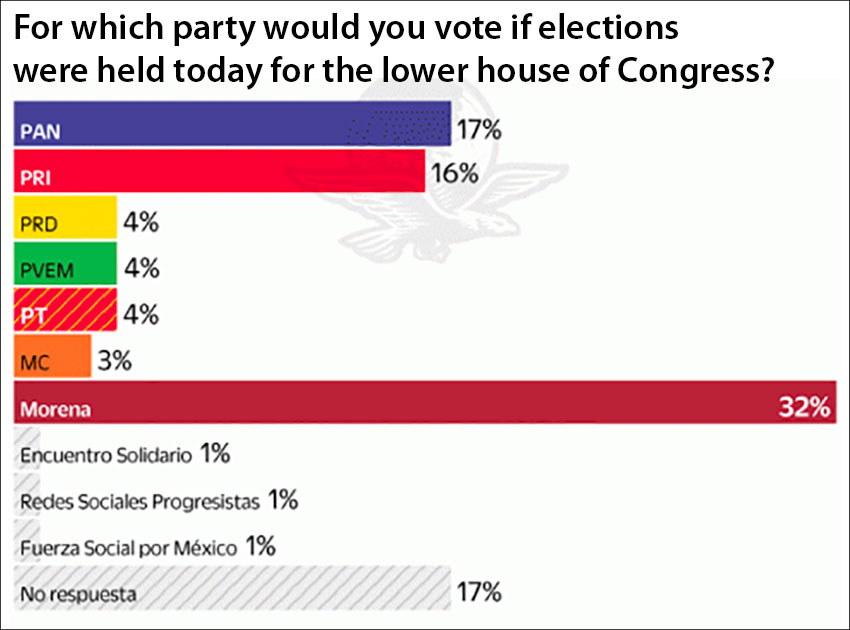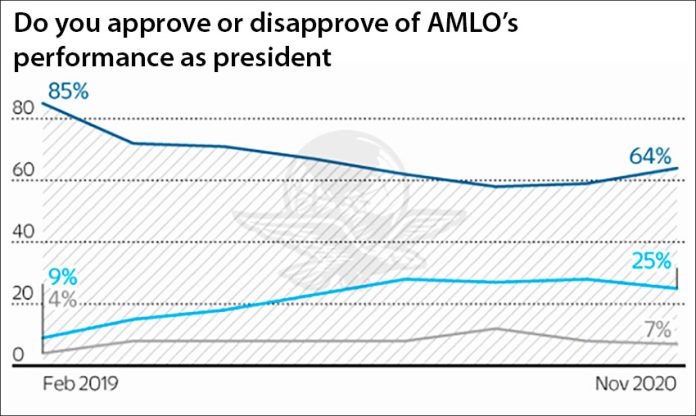The ruling Morena party has a clear advantage over its two main rivals just six months out from the 2021 midterm election while President López Obrador continues to enjoy the support of a strong majority of Mexicans, according to two new polls.
A survey conducted by the polling firm Buendía y Laredo for the newspaper El Universal between November 12 and 18 found that 32% of respondents would vote for Morena if the midterm election, at which all 500 seats of the lower house of Congress will be up for grabs, was held today.
That result gives Morena a 2-1 lead over both the National Action Party (PAN) and the Institutional Revolutionary Party (PRI), which attracted 17% and 16% support, respectively.
None of the other seven parties to contest the June 6, 2021 election attracted the support of more than 5% of respondents.
Of the 1,000 people polled, 4% said that they would vote for each of the Democratic Revolution Party (PRD), the Ecological Green Party (PVEM) and the Labor Party (PT) while 3% said they would cast their ballot for the Citizens Movement (MC). One in six respondents – 17% – declined to reveal their voting intention.
While the poll indicates that Morena is the most popular political party in the country, its support has declined 20 points since February 2019. Meanwhile, support for the PAN and the PRI increased nine and eight points respectively from 8% in February last year.
Only 27% of respondents to the new poll were aware that an election to renew the Chamber of Deputies will be held next June, indicating that most voters are not yet paying close attention to the upcoming electoral process.
Preferences are prone to change as the election date approaches and voters tune in more closely to the platforms parties are running on and who their local candidates are. Nevertheless, Morena is in an enviable position.
While 32% of respondents said they planned to vote for the party founded by López Obrador, 54% said that they had a very good or good opinion of it. Only 23% of those polled said that they had a bad or very bad opinion of Morena, leaving the party with a positive over negative differential of +31.
Among the seven parties with at least 3% voter support, only two others have a positive opinion differential. They are MC, with a +14 differential, and the PT – a Morena ally – at +6.
The PRI, which was in power from 2006 to 2012 and most of the 20th century, has the worst opinion differential at -31 – a figure that is perhaps unsurprising given the number of scandals that plagued the previous federal government – followed by the PRD (-12), the PAN (-11) and the PVEM (-1).

Another positive for Morena is that López Obrador’s approval rating remains strong almost two years after he took office. The poll commissioned by El Universal found that 64% of respondents approved of the president’s performance while only 25% disapproved.
His approval rating, however, has declined 21 points since February 2019 when it was 85% just two months after he was sworn in.
A notable finding of the El Universal poll is that 64% of respondents approve of López Obrador’s performance but only half that number – 32% – said they would vote for Morena at the midterm election. The discrepancy apparently indicates that a sizable portion of the population support the president, who will celebrate two years in office on Tuesday, but want Congress to keep him in check rather than act as a rubber stamp for his proposals.
A poll commissioned by the El Economista newspaper also found a strong approval rating for AMLO, as the president is best known.
Conducted over the internet with a much large sample size of 87,735 respondents, the poll found 58.4% approval of the president’s performance.
Approval was highest in Guerrero, Tabasco and Tlaxcala, where more than 70% of respondents supported López Obrador, and lowest in Aguascalientes, Chihuahua and Colima, where fewer than 40% of those polled approved of the president’s performance.
The combined 58.4% figure is more than 10 points higher than in June when AMLO’s approval rating dropped to 47.5%, according to an El Economista poll conducted that month.
The president’s 47.5% rating, recorded the month after Mexico’s coronavirus restrictions were eased following a two-month suspension of nonessential economic activities, was his lowest since taking office in December 2018. His highest, according to El Economista polls, was 67.1% in February 2019.
López Obrador’s current approval rating is the third best among Mexico’s six most recent presidents after they served two years in the job.
Carlos Salinas, president from 1988 to 1994, had a 67% approval rating after two years in office, nine points higher than AMLO, while Felipe Calderón, president from 2006 to 2012, had a rating of 61% two years into the job.
López Obrador’s approval rating is 17 points higher than that of his predecessor Enrique Peña Nieto, who had a 41% rating two years after taking office. AMLO is four points ahead of Vicente Fox, president from 2000 to 2006, and one point ahead of Ernesto Zedillo, who served from 1994 to 2000.
If the 2018 presidential election was held again today, 48.9% of respondents to the El Economista poll would vote for López Obrador. That level of support is just below the 53.2% of the vote he attracted in July 2018.
However, removing the 14.1% of respondents who declined to say who they would vote for, support for López Obrador rises to 56.9%.
The “effective” support for AMLO is more than double that of Ricardo Anaya, who represented a PAN/PRD alliance at the 2018 election, and more than triple that of José Antonio Meade, who ran as the PRI candidate.
A similar percentage of respondents – 57.2% – said that they intend to vote for López Obrador to complete his six-year term at a “revocation of mandate” referendum slated to be held in 2022.
Asked how they would evaluate the president’s performance in a range of specific areas, 51.5% of respondents said that he has reduced corruption a lot or quite a lot. Although only just over half of those polled commended his performance in the area, it was López Obrador’s best result.
However, the result doesn’t exclude respondents who declined to offer a positive or negative assessment. Therefore the “effective” result for the president in that area and the 17 others respondents were asked about would be higher.
The president’s second and third best results were in “strengthening democracy” and “protecting citizens’ rights” while his worst results were in the areas of “achieving peace” – 2020 is on track to be most violent year on record, “combatting crime” and “reducing poverty.”
Source: El Universal (sp), El Economista (sp)
